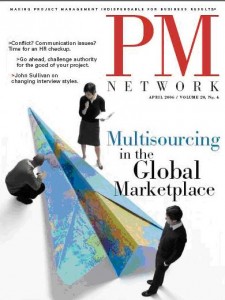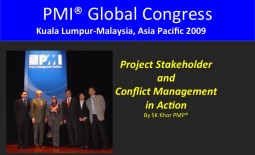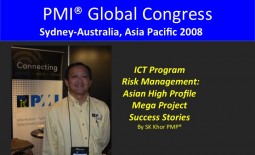PMI PM Network (Apr 2006) : Securing Mega IT Project in China
Shorter version of this publication was published by SK Khor PMP on PMI PM Network Magazine (April 2006 Edition)
Cultural differences shouldn’t stop foreign organizations from pursuing projects in China, but they must go in prepared. BY S. K. KHOR, PMP
Companies shouldn’t be put off by the myths surrounding project work in China. You don’t have to speak Chinese or work for a multinational corporation with a long local presence to secure business deals in the country. Be prepared for differences in the way business is conducted, however. Terms and conditions that may seem unusual in your country are often longstanding traditions embedded in the Chinese business environment.
Companies must understand what goes on behind the procurement process, says Wang Yi Ping, a senior project business director at the China Electronic EngineeringDesign Institute, Beijing. ……
……………………………..
SECURING Mega IT Projects in China
As the newly promoted Regional Manager in your organization, your first task is to secure by tender, a project which your organization has been pursuing, and to formalize it with a contract. What would your immediate reaction to this first assignment from your CEO who is banking in on this project for the major breakthrough into the massive Information Technology market in the world fastest growing market of China be?
The common and immediate responses from a person facing this scenario are most often that they do not have the ability to speak and understand the Chinese language nor the Chinese’s business practices. However, multi cultural issues should not be a hindrance. The fact that you have to speak Chinese to secure business deals in China is a myth. Nor it is necessary for your organization to be one of those Multi National Corporation with a long local presence in China before you can secure your first IT contract in China.
In China, the difference lies in not treating it as just another tender whereas a norm the justification and logistic for the entire project has been established and confirmed. Understanding what goes on behind the entire procurement process is according to Mr. Wang Yi Ping, a Senior Project Business Director of China Electronic Engineering Design Institute says differentiate a successful tender and a failure. “ In China, it is prudent for the contractor to find out how the customer intend to source for the project funding, the bidding approach and processes, the contracting models and most importantly the contractor has to find out the composition of the evaluation committee and the criteria for evaluation right up to the management of the clarification session until the deal is formalized with the signing of the contract”. Mr. Wang added.
Different type of projects will of course warrant different handling; the range can be as diversified from a private enterprise project such as a Call Center System for a bank to a Mega IT infrastructure system project. In the later, the Chinese National policies may have direct relevance and could affect the overall project strategy and direction. A national mega airport project for example has seen the incorporation of clauses in the Request for Proposal (RFP), which restricts foreign companies’ participation or insists on the transfer of technology from the foreign partner to local Chinese party. It was highlighted by some unofficial sources that the incorporation of these clauses serve to reduce the dependency for the services of the contractors upon completion of the project namely during operation and maintenance phases.
PROJECT FUNDING
The funding source is the most crucial piece of information a potential foreign contractor ought to obtain, as it can have direct influence on the procurement mode, according to Jack Yang, CEO of Groupwise Technology based in Beijing who has recently been awarded a sizeable IT Project for Nanning State Government alongside with a few International European based IT solution provider. Some funding sources have stipulation, which only entails a local Chinese company with a certain amount of paid up capital to participate whilst others put forth a preference for international participation. They are yet some who would stipulate the preference for the currency of transaction which most often than not is in the Chinese currency of RMB.
Project Procurement Processes
There have been many vendors who have been caught in many unexpected situations. Upon purchasing the Request for Proposal (RFP) from a prestigious project owner in Beijing, a group of five prospective companies were requested by the project owner to work together to submit a common IT solution for the project. The project owner only stipulates verbally that one of the five would be awarded the contract to implement the proposed common solution. Three companies opted out as there is no agreement to indicate that their services would be paid. The remaining two companies however proceeded to offer a “pre-contract” free service in the hope that it would develop “Quan Xi” of goodwill and of course the ultimate aim of securing the contract.
Procurement Committee
The Procurement Committee is formed in addition to the project team and this team normally comprises of prominent personnel who is not part of the organisation and whose identity would only be revealed very much later in order to keep their identity from being made known to potential contractors. Even then, the procurement committee decision can be skewed towards the preference of the individual team where factors like price or technology comes into play. A prior relationship or “Quan Xi” can also affect the outcome of the bidding.
Negotiation
Top down decision-making is the common practice in China. It can be deemed as a complex procedure and rather unconventional if the contractors are not familiar with the Chinese negotiation capabilities.
Generally, the Chinese customer are familiar and do utilise the more familiar American or European negotiation skills which to the rest of the business world is an accepted form of practice. However, it is wise not to be caught off guard when “out of the norm” negotiation practice, which is only peculiar to the Chinese, is adopted. It could take effect in the form of a literally “closed door” or in this case “locked door” meeting where both customer and vendor are “locked “ in a hotel room with no communication with the outside until an agreement is reached or a contract signed. It has been recorded that some of these meetings can last up to 48 hours. Another scenario would be then the customer invite two potential vendors into two different rooms and commence negotiations concurrently with or without the vendor knowing that a similar meeting with a competitor is being held next door. Upon the expiry of the 24 or 48-hour time box, the customer would then decide as to whom the contract would be awarded to. Some people said there is nothing unethical as they are merely seeking the best deal. But some, especially those from the West feel strong and against the ‘Reverse-Auction’ negotiation tactic used.
SIGNING FOREIGN CURRENCY BASED CONTRACT
If a foreign organisation can only execute a contract based on the USD currency or the Euros, it is wise to note that the actual transaction can only be executed out of the country as China observed very strict capital currency control and has a very complex tax system. In a situation like this, the Chinese buyer would normally propose to the contractor to sign a tri-party contract whereby the role awarded to the contractor would shift from a prime contractor to that of a sub-contractor. The appointment of a third party who in this case is an organisation who has been authorised by the Chinese Government to sign non RMB currency contract would emerged as the main contractor. It is prudent to be cautious when confronted with a situation like this.
TO VENTURE OR NOT TO VENTURE?
Ultimately, it is important to ensure that you are well armed in your preparation for the way business is conducted in China. The traditional ways of conducting business, the terms and conditions which may seems ‘unusual’ in your country may has long been embedded in the Chinese business environment and cannot be changed instantaneously.
A brilliant history of past performances in your country will not guarantee similar successes in China. Since China opens its doors, there has been much foreign participation in securing projects in China. Some have managed to have profitable closing just as there are many more who are encountering problems in closing their projects or taking the profit out from China






